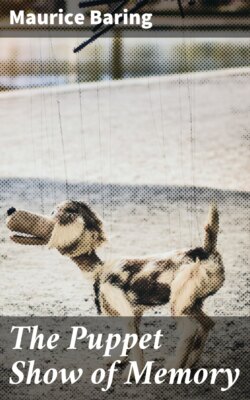Читать книгу The Puppet Show of Memory - Baring Maurice - Страница 13
На сайте Литреса книга снята с продажи.
Оглавление“The Honourables are going away to-morrow,
And ten to one the Count goes too.
We poor swinies we don’t go,
We poor swinies we don’t go.
The Honourables are going away to-morrow,
And ten to one the Count goes too.”
When we went home for the holidays for the first time from Eastbourne the train stopped at Slough. The St. Vincent’s term had ended a few days before the Ascot term, and there, on the platform of Slough Station, we saw the Headmaster of our Ascot school, surrounded by the first division and evidently enjoying a first division expedition.
“Why don’t you put your head out and say how do you do to them?” said my mother, but Hugo and I almost hid under the seat, and we lay right back from the windows, spellbound, till the train went on.
Broadwood and I used to meet in the holidays in London. Broadwood used to say to his parents that he was having luncheon with me in Charles Street, and I used to say I was having luncheon with Broadwood in Eccleston Square, but what really happened was that we used to go to a bun shop, or have no luncheon at all, as neither of us would be seen at luncheon with a friend in each other’s homes.
Broadwood said that his mother cross-questioned him about our house, and that he gave a most fantastic account of our mode of life.
While we were at school at Eastbourne many eventful things happened at home. In the summer holidays of 1886, Hugo and I went with my father to the Cowes Regatta.
In September of the same year my father, Hugo, and myself went for a long cruise in the Waterwitch. We started from Membland and stopped at Falmouth, and Mounts Bay, and saw over St. Michael’s Mount, and then we sailed to the Scilly Isles, where we spent a day in the wonderful garden of Tresco. At that time of year the sea in the Scilly Isles was as blue as the Mediterranean, especially when seen through the fuchsia hedges and the almost tropical vegetation of the Tresco gardens. We then sailed across the Irish Channel to Bantry Bay and up the Kenmare River and drove in an Irish car right across the mountains to Killarney.
Next year was Jubilee year. Both my eldest sisters were married that year. Hugo and I attended these weddings and the Jubilee procession as well, which we saw from Bath House, Piccadilly, but I don’t remember much about it, except the Queen’s bonnet, which had diamonds in front of it, and the German Crown Prince in his white uniform, but I remember the aspect of London before and after the Jubilee, the Venetian masts, the flags, the crowds, the carriages, the atmosphere of festivity, and the jokes about the Jubilee.
We went on acting a French play every year at Christmas, and it was before Margaret was married that we had our greatest success with a little one-act play by Dumas fils called Comme Elles sont Toutes, in which Margaret and Susan did the chief parts quite admirably, and in which I had a minor part. This was performed at Christmas 1886. After Elizabeth and Margaret were married, Susan and I and Hugo continued to act, and we did three plays in all: Les Rêves de Marguerite (1887); La Souris (1888); l’Amour de l’Art (by Labiche) (1889).
Another home excitement was the building of an organ in the house in Charles Street. It was by way of being a small organ at first, but it afterwards expanded into quite a respectable size, and had three manuals. This gave me a mania for everything to do with organs. I got to know every detail in the process of organ-building and every device, tubular-pneumatic, and otherwise. The organ we had at Membland had been built by Mr. Hele of Plymouth, and when we went back to Membland, when the organ was being built in London, my mother said: “Don’t say anything to Mr. Hele about this, as he will be hurt at our not having employed him.” One day Mr. Hele came to tune the organ, and I disappeared with him, as was my wont, right under the staircase into the very entrails of the organ and watched him at his work. While we were there in the darkness and the confined space, I confessed to him the secret that we were having an organ built in London. When we came out he went straight to my mother and said that Messrs. Hele would have been only too glad to build an organ in London. When my mother asked me how I could have told Mr. Hele we were having an organ built in London, I said I thought that as we were right inside the organ, in the dark and in such a narrow space, that it wouldn’t matter, and that he would forget. When my mother told Chérie of this episode, Chérie laughed more than I ever saw her laugh, and I couldn’t understand why; I was, in fact, a little offended.
